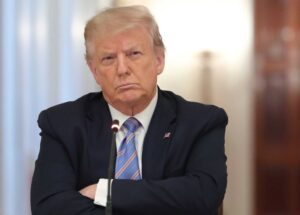Britain is bracing for a major economic hit after President Donald Trump refused to exempt the UK from a wave of new global trade tariffs, with Downing Street now expecting duties of up to 20 per cent to take effect on Wednesday — what Trump has branded “Liberation Day”.
Despite weeks of behind-the-scenes negotiations, the US has refused to sign a proposed UK economic deal that ministers hoped would secure a carve-out from the sweeping measures. Officials said the deal, which includes concessions on artificial intelligence, tax and agriculture, remains “on the table”, but Trump has opted for a blanket tariff announcement without exemptions to maximise political impact.
The Office for Budget Responsibility warned last week that the imposition of tariffs could deliver a 0.6 per cent blow to GDP, equivalent to £18 billion, and completely erase the £9.9 billion fiscal headroom that Chancellor Rachel Reeves had carved out in her spring statement — potentially forcing further tax rises or public spending cuts.
While Prime Minister Keir Starmer has been careful to cultivate ties with Trump and has so far refrained from public criticism, pressure is mounting for a firmer response. Downing Street insists Starmer will “act in the national interest”, but may delay retaliation in the hope of reaching a longer-term UK-US trade deal.
Ministers are increasingly concerned about a potential surge in cheap foreign imports, originally destined for the US, flooding UK markets. Plans are being drawn up to protect key sectors — including automotive, ceramics, and heavy machinery — by imposing import quotas or emergency tariffs to prevent market disruption.
The government has ruled out lowering UK animal welfare standards, but may be willing to offer tariff reductions on US agricultural imports, including beef, chicken and pork, as part of a future trade agreement.
Industry bodies and trade experts are urging the government to act quickly. Rachel Timmins of Ceramics UK warned that US tariffs could deliver a “double whammy” to British exporters by increasing costs abroad while exposing them to greater foreign competition at home. Meanwhile, the Trade Remedies Authority has 15 active investigations into alleged “dumping” — 11 of which relate to Chinese goods — and may struggle to cope with a potential surge in new cases.
Peter Navarro, Trump’s top trade adviser, confirmed that the administration had no plans to soften its stance, claiming the tariffs would generate $6 trillion in revenue over the next decade and fund US tax cuts. “Tariffs are tax cuts. Tariffs are jobs,” he said.
Former ambassador Lord Kim Darroch said Starmer should learn from Canadian Prime Minister Mark Carney’s firm response, which helped to blunt Trump’s approach. “If Trump sees concessions work, he’ll use tariffs again and again,” Darroch warned.
Trump’s decision triggered sharp falls in global stock markets, with the FTSE 100 losing 1.4%, while investors flocked to safe-haven assets like gold, which is poised for its biggest quarterly gain in nearly four decades.
With the tariff clock ticking, Starmer now faces a delicate balancing act: protect UK businesses from economic fallout without derailing fragile transatlantic relations. But with industry confidence already shaken, and the economy still fragile, the cost of waiting could soon outweigh the cost of action.
